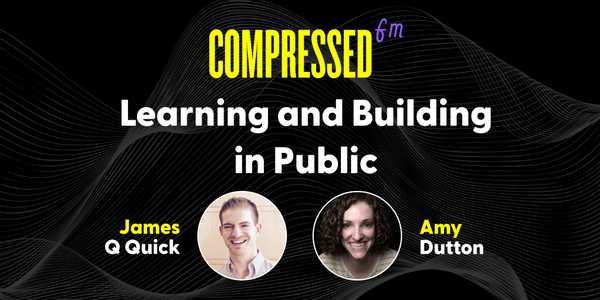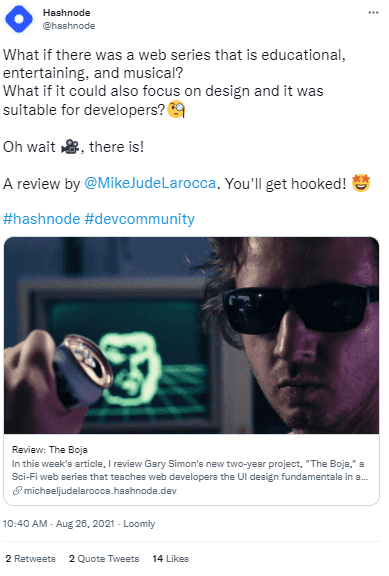The Importance of Learning in Public
Published on August 30, 2021
This week's article covers a compressed.fm episode where James Quick and Amy Dutton teach us the importance of learning in public, giving us the best opportunity to get noticed and to become hireable!

"Compressed.fm" is a weekly podcast hosted by James Q Quick and Amy Dutton, covering web design and development.
James Quick
James is a Fullstack Developer that lives by the motto "Learn Build Teach!"
He has a degree in Computer Science from Vanderbilt University, worked for Microsoft as a Technical Evangelist, and is currently working at Auth0.
James provides us with premium programming content weekly on his YouTube channel.
Amy Dutton
For the past 20 years, Amy Dutton has been designing and developing websites.
She graduated from college in 2006 from Middle Tennessee State University with a degree in Radio / TV Broadcasting and a concentration in Animation.
Amy is the Senior UI/UX Designer and Frontend Developer at Zeal.
Amy loves to teach! She is the creator of the Self Teach Me YouTube channel and website, where she teaches you how to code.
How to get started learning & building in public
James tells us that it is common for developers to "not know what to write about" when they want to start learning & building in public.
James answers this common question with this perceptive question, "what is the last thing that you learned?"
Write about
- Problems you solved
- Things you learned
- Projects you already built
- Projects you would like to build
- Share what you learn along the way
By writing about what you are learning, not only are you helping others, you are creating documentation for yourself to reference in the future.
Why would they learn from you
Amy and James tell us that the most qualified person to teach a topic is someone who just learned that topic.
As you are a student learning topics and documenting them, other students will relate to you and how you teach them better, then they would relate to an experienced developer who teaches by theory, rules, and documentation.
Amy and James also explain that experienced developers, such as themselves, sometimes struggle in relating to and instructing students learning from scratch because it's been so long since they were beginners.
"If you're the person who just learned something, you're the best person to understand what it's like to learn that thing, and now you can translate that to something that other people can benefit from."
-James Quick
How & where you can learn in public
James recommends the blogging platform Hashnode. You can set up an account for free, and he is impressed with the work that they have done and the community they have built.
Hashnode has a "built-in audience," which will help you to get exposure. They also allow you to republish your articles on their website, and Hashnode promotes articles they like!
Hashnode promoted the very first article that I published on their site!

To learn more about republishing your articles on Hashnode, you can read this fantastic article written by Catalin Pit.
Increase Your Custom Blog Traffic By Republishing On Hashnode
James also recommends Twitter as a great place to learn in public. When you learn something new, James tells us to send a tweet about it. You will have a history of what you learned, and then you can read them later and even write a blog post about the topics you discussed.
Twitter also has a great "Tech Community!" Connecting with like-minded people who support you is a great way to stay encouraged while learning in public.
With Twitter, you can:
- Learn from others tweets
- Attend Twitter Spaces
- Participate in 100 Days of Code
Accountability
To receive the benefits that come along with learning in public, you must commit to documenting your work with consistency.
A great way to commit to learning in public is to take on the Twitter #100DaysOfCode challenge.
Alex Kallaway created the 100 days of code challenge as a "light-weight challenge" and a way to hold yourself accountable by committing to a code learning schedule.
To learn more about this challenge, check out the official website: 100 days of code
Benefits of learning & building in public
By learning and building in public, you create an online presence that demonstrates your commitment to learning to potential employers, clients, and colleagues and provides a portfolio of work that showcases your skills.
Having an online presence gives you visibility that can lead to many opportunities. It will also help you to stand out from other developers, giving you a competitive advantage.
Be sure to listen to the entire episode!
Learning and Building in Public

- 🔊 iTunes
- 🔊 GooglePodcasts
- 🔊 Spotify
- 🔊 Stitcher
- 🔊 Castbox
- 🔊 Pocket Casts
Be sure to check out my James Quick Teacher Feature article!
Teacher Feature: James Q Quick
To learn more about learning in public, you can read my article:
Shawn Wang (Swyx): Actionable tactics that will help you to become hireable
( Includes a 30% discount code for: "The Coding Career Handbook" )
James's links
Amy's Links
Advance your career with a 20% discount on Scrimba Pro using this affiliate link!
Become a hireable developer with Scrimba Pro! Discover a world of coding knowledge with full access to all courses, hands-on projects, and a vibrant community. You can read my article to learn more about my exceptional experiences with Scrimba and how it helps many become confident, well-prepared web developers!
Important: This discount is for new accounts only. If a higher discount is currently available, it will be applied automatically.
How to Claim Your Discount:
- Click the link to explore the new Scrimba 2.0.
- Create a new account.
- Upgrade to Pro; the 20% discount will automatically apply.
Disclosure: This article contains affiliate links. I will earn a commission from any purchases made through these links at no extra cost to you. Your support helps me continue creating valuable content. Thank you!
Conclusion
By learning in public, we create an online presence for ourselves, giving us a competitive advantage that can lead us to various opportunities.
Creating online content, such as blog articles, tutorial videos, and Podcasts, will put us in the spotlight, exposing us to both positive and negative feedback.
When receiving feedback, if we receive constructive criticism, it becomes a learning experience for us. If we are just being "Trolled," we must not get discouraged; we need to learn how to deal with these types of situations better and grow a "thick skin."
When it comes to being criticized, James Quick said it best, "Either there is a learning opportunity for you or not. If there is not a learning opportunity for you, completely ignore it."
Are you now encouraged to learn in public and create an online presence to advance your career? Did James's advice on handling criticism help you? Please share the article and comment!
Please share it!

